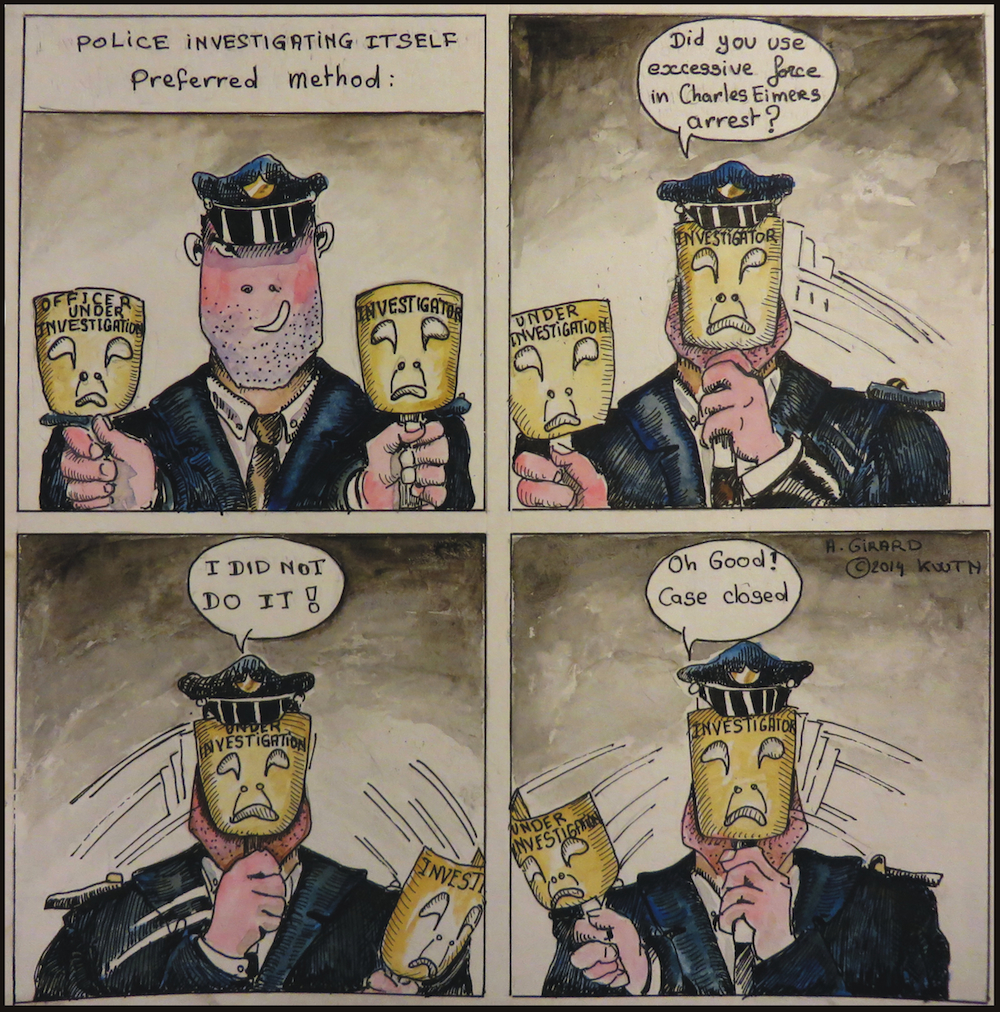Eimers Grand Jury Investigation: FBI Helped State Attorney Booby Trap Her Own Case
VIDEO: KEY WEST’S LACK OF EMPATHY
IN STARK CONTRAST WITH NY AND FERGUSON
by Naja and Arnaud Girard
FBI HELPED STATE ATTORNEY BOOBY TRAP HER OWN CASE
“It’s a very painful day for so many New Yorkers,” said New York City’s Mayor, Bill de Blasio last Wednesday following the Grand Jury’s decision not to indict a police officer accused of choking to death an un-armed black man, Eric Garner. A similar decision recently caused violent protests in Ferguson, Missouri over the fatal police shooting of un-armed black teenager, Michael Brown, and three months ago, in Key West, another grand jury cleared 13 Key West police officers of any criminal liability for the death of Charles Eimers despite the fact [and contrary to KWPD’s initial claims] that Mr. Eimers had been initially compliant with police.
Which begs the question: Do grand juries ever indict police officers? The numbers are revealing. According to the Bureau of Justice Statistics, U.S. attorneys prosecuted 162,000 federal cases in 2010, the most recent year for which we have data. Grand juries declined to return an indictment in only 11 of them. However, according to Phil Stinson of Bowling Green University, the ratio is radically different when the accused is a police officer. According to Stinson’s research, during the period 2005 through 2011, there were 2,718 officer-involved “justified homicides” whereas only 41 police officers were charged with criminal homicide during that period.
As the conspiracy theory goes, state attorneys, cornered by public opinion to bring cases against police officers, set the case on self-destruct mode.
In Key West, when State Attorney Catherine Vogel presented the Eimers case to the grand jury, she introduced a poisoned pawn into the witness list. His name is Chuck Joyner. He is the superstar expert defense witness for police officers in trouble with the law. Joyner gained national notoriety after publicly defending a Houston police officer who had shot and killed a wheelchair-bound double amputee. Joyner argued that because the one-armed, one-legged man was waving a ballpoint pen there was reasonable justification for the officer to shoot him square in the head.
The story has kafkayen dimensions: Apparently Vogel paid Joyner $4,262.50 to testify against her own prosecution team. Better yet, the whole deal was reportedly set up by the FBI. This week while being deposed by the Eimers family attorneys, Joyner admitted to having been recruited by local FBI agent Patty Thompson [who works at the federal building on Simonton Street] to rescue 13 Key West police officers accused of causing Charles Eimers’ death.
Arguably, the Eimers grand jury set-up topples in cynicism anything that went on in Ferguson under the direction of prosecutor Robert Mcculloch. Scholars have qualified Mcculloch’s “friendly cross-examination” of Defendant officer Darren Wilson as “highly unusual” and “deeply unfair”. Wilson, who was accused of an unjustified shooting of Michael Brown received, they said, “special treatment.” Unlike Catherine Vogel, Mcculloch did not, however, go so far as to hire an expert to torpedo his own case.
Grand jurors are the captive audience of prosecutors. It all happens behind closed doors and can result in granting immunity to police officers without any public scrutiny.
Closed trials, wrote Supreme Court Justice William Brennan, “breed suspicion of prejudice and arbitrariness, which in turn spawns disrespect for law.”
See also “Shadow Trial, Prosecutors in Ferguson violated our right to an open criminal justice system.” an article by Dahlia Lithwick and Sonja West published in Slate.
The right to open trials is “a shared right of the accused and the public, the common concern being the assurance of fairness.” [1986 case, Press Enterprise v. Superior Court]
Under the Sixth Amendment, the administration of criminal justice must be kept open to the public. But what is the difference between a grand jury investigation and an unconstitutional secret trial? Where is the line and did Catherine Vogel and Robert Mccolloch cross it?
Well let’s see. What follows is the grand jury’s purpose as defined by the U.S. Supreme Court in the 1992 case, U.S. v Williams:
“It is axiomatic that the grand jury sits not to determine guilt or innocence, but to assess whether there is adequate basis for bringing a criminal charge.” Quoting Blackstone, the Court found the grand jury was “only to hear evidence on behalf of the prosecution.” Never has “the suspect under investigation by the grand jury been thought to have a right to testify or to have exculpatory evidence presented.”
So what was the Monroe County prosecutor doing when presenting not only expert testimony on the merits of the case, but expert testimony in opposition to the prosecution of the accused? Not surprisingly Mr. Joyner is now on KWPD’s witness list for the defense in the civil rights case filed by the Eimers family.
Are these prosecutors violating the U.S. Constitution by conducting defacto secret trials where they manipulate jurors into “acquittal” of police officers? The grand jury system, initially meant to protect defendants against abusive state prosecutors has morphed into a process by which the state legitimizes its practice of “not prosecuting its own”. After all, prosecutors are partners with the police. They depend entirely on officers’ work and testimony in order to fight crime.
“It is my intent,” wrote Citizen Review Board [CRB] member Tom Milone, “to ask the board to send a letter to the US Department of Justice requesting them to investigate the Eimers matter, including the incident itself as well as the investigations done by KWPD, FDLE, Monroe County State Attorney and the Monroe County Medical Examiner.”
KEY WEST LEADERSHIP
While the death of Charles Eimers in the hands of Key West police clearly resembles the tragic fate of Eric Garner in the hands of New York police officers, the reaction of City leaders in New York and Key West couldn’t be further apart.
Both cities are facing civil lawsuits brought by family members of the deceased men. [New York City has been put on notice that the family intends to sue for $75 Million] Yet, while Mayor Cates in Key West has remained completely silent, Mayor Bill de Blasio in New York City offers condolences, apologies, and promises of reform including “retraining the entire police force,” and expulsing officers who are “brutal or racist or corrupt.”
“He [Eric Garner] was a father, a husband, a son, and a good man,” said Mayor de Blasio. He may as well have been describing Charles Eimers. “He should be with us,” continues de Blasio, “and is not. It is a simple fact. I spent some time with Ben Garner, Eric’s father, who is in unspeakable pain.”
In Key West, Mayor Cates was not present at Eimers Candlelight Memorial on Thanksgiving night. In fact, the only person who has tried to present public apologies and condolences to Charles Eimers’ family is Key West’s lone “bearded-prophet”, Sloan Bashinsky, who spoke of Eimers during Citizen comments at Tuesday’s Commission meeting. The response given by Commissioners was as dignified as a bar brawl. “You want to pick a fight with me?” asked Commissioner Rossi. “Thank you Commissioner Rossi,“ added Commissioner Tony Yaniz, “for having the stones to say the way I feel.”
Is the image of this “tropical paradise” so fragile and so dear to our tourist-trap aspirations that we can no longer afford basic human decency?
A link to a video showing Tuesday’s Citizen Comments is here.
DID YOU LIKE THIS STORY? SUPPORT THE BLUE PAPER
Help us continue to bring you local investigative journalism… Click on the image to make a donation [NOT tax deductible].



